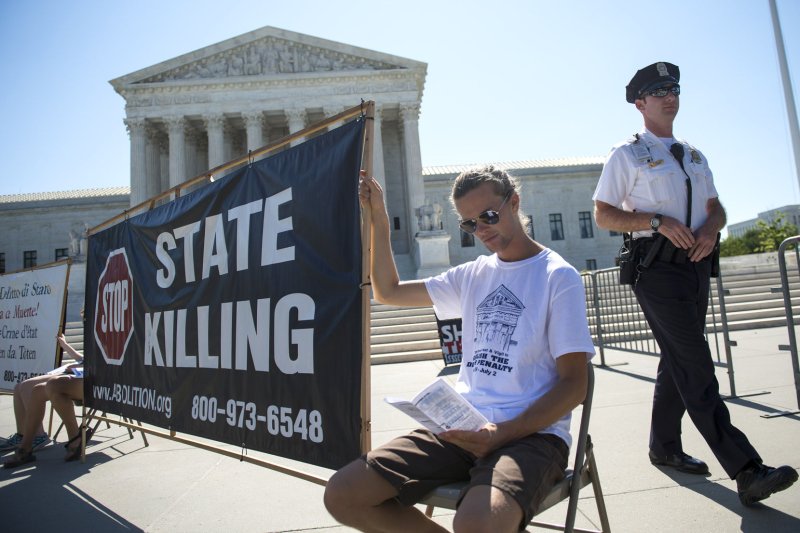The Supreme Court on Tuesday struck down a law in Florida that allowed judges to designate death sentences for defendants instead of the jury of a murder case. The ruling mostly relies on Ring vs. Arizona, a 2002 Supreme Court decision that stated jurors have final say in death sentence cases tried by a jury. File photo by Kevin Dietsch/UPI |
License Photo
WASHINGTON, Jan. 12 (UPI) -- The Supreme Court on Tuesday struck down a law in Florida that allowed judges to designate death sentences for defendants instead of the jury of a murder case.
In the Hurst vs. Florida case, the court ruled 8-1 in favor of 37-year-old Timothy Lee Hurst, who was convicted in the 1998 murder of co-worker Cynthia Harrison, the manager of a Popeyes fried chicken restaurant in Pensacola. Justice Samuel A. Alito dissented.
Under Florida law, the maximum sentence for a murder conviction alone is life imprisonment. A felon may only be sentenced to death if an additional sentencing proceeding "results in findings by the court that such person shall be punished by death." Although a Florida jury makes a recommendation in the proceeding, a judge makes the final determination on whether the convicted felon is sentenced to life imprisonment or to death.
The Supreme Court reversed an earlier decision by the Supreme Court of Florida that rejected Hurst's case arguing that his death sentencing violated his constitutional rights.
"The Sixth Amendment protects a defendant's right to an impartial jury. This right required Florida to base Timothy Hurst's death sentence on a jury's verdict, not a judge's factfinding," Justice Sonia Sotomayor wrote in the opinion of the court. "Florida's sentencing scheme, which required the judge alone to find the existence of an aggravating circumstance, is therefore unconstitutional."
The ruling mostly relies on Ring vs. Arizona, a 2002 Supreme Court decision that stated jurors have final say in death sentence cases tried by a jury.
Although Hurst won the case, it does not necessarily save him from the death penalty. Florida state courts would need to decide if the now-void sentencing procedure was a "harmless error" that would not have had any bearing on Hurst's death sentence, meaning that Hurst would have been sentenced to death regardless of exactly how it occurred.
Hurst could potentially be re-sentenced in an attempt to avoid death, but the previous juries involved in the Florida process to determine death sentences all recommended Hurst should receive the death penalty in split decisions.















